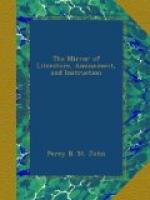Origin of the Tea Trade of the East India Company.—In 1668, the East India Company ordered “one hundred pounds weight of goode tey” to be sent home on speculation. A taste for the Chinese herb was created and carefully fostered; the invoice was increased from year to year, until it now amounts to 30,000,000 pounds weight (notwithstanding the excessive duty of 100 per cent, and the onerous restrictions of the commutation act, since 1784), yielding an annual revenue to government, on a luxury of life, of about 3,300,000_l_. sterling, with scarcely any trouble or expense in the collecting;—employing 35,000 tons of the finest shipping,—requiring annually nearly 1,000,000_l_. sterling worth of cotton, woollen, and iron manufactures, and affording employment to a numerous class of society, for the wholesale and retail dealing in a leaf collected on the mountains of a distant continent!
To enable them the better to prosecute this valuable commerce, the East India Company sought and obtained permission to build a factory at Canton, where their agents were permitted to reside six months in the year—a favour specifically accorded as a matter of compassion to foreigners, who are carefully debarred all intercourse with the interior of the country; a dread being entertained that the introduction of Europeans to settle in China, would lead (according also to ancient prophecy) to the total subversion of the empire.
Other brunches of trade were subsequently added to that of tea. In 1773, the East India Company made a small adventure of opium[6] from Bengal to Canton; and the consumption of opium increased as rapidly among the Chinese as tea did among the English, until it now yields (although a contraband trade) 14,000,000 Spanish dollars annually,[7] and pays a revenue to the Indian Government of 1,800,000_l_. sterling. Raw cotton forms another extensive article of export to China; it is in general a less profitable remittance than bills of exchange, but the exportation is encouraged for the benefit of the Indian territories.




